#Saint John the Divine
Text

Saint John the Divine faithfully transcribes his divine visions of the end of the world. He is sitting cross-legged, writing the Book of Revelations with his pen and knife. John draws inspiration from the eagle, the symbol of his ministry, which faces him and draws his eye. By recording his mystical inspiration, John authenticates it and preserves it for future readers. A detached parchment leaf. (Cologne, c 1340 CE). J Paul Getty Center, Los Angeles, CA. Ms. 108 (2011.24), verso :: [Robert Scott Horton]
* * * *
“The world suddenly vanished from view like a morning mist. I was left alone with Reality.”
― Paul Brunton, Advanced Contemplation: The Peace Within You
4 notes
·
View notes
Text
Revealed Religion : Benjamin West. 091 of 100 Bible images
091 Saint John of Patmos called to write the Revelation
Saint John the Divine called to write the Revelation. 1797. Oil on five sheets of paper mounted on canvas, itself mounted on wood. 57 7/8 × 26 1/2 ins (147 × 67.3 cms). The Museum of Fine Arts, Houston.
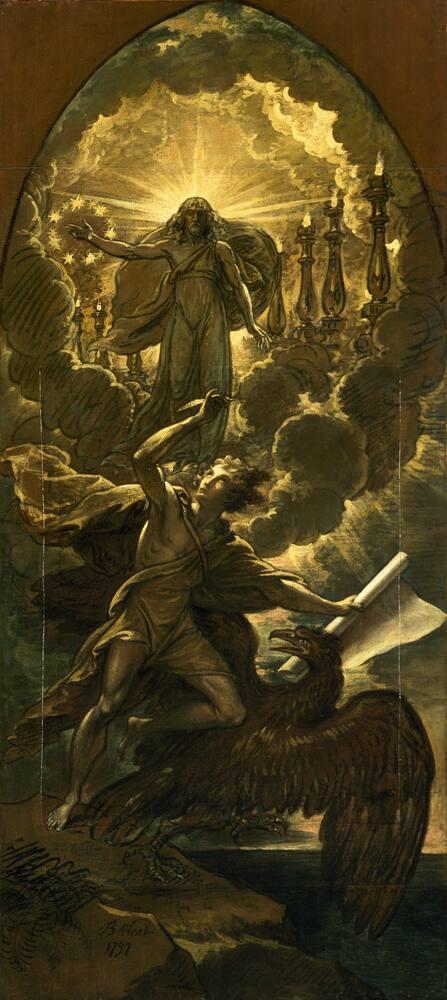
View On WordPress
#Apocalypse#Benjamin West#Bible#eagle#Houston Museum#John of Patmos#Phillip Medhurst#Revealed Religion#Revelation#Saint John the Divine#Saint John the Evangelist#seven churches#seven lamps#word of God
4 notes
·
View notes
Text


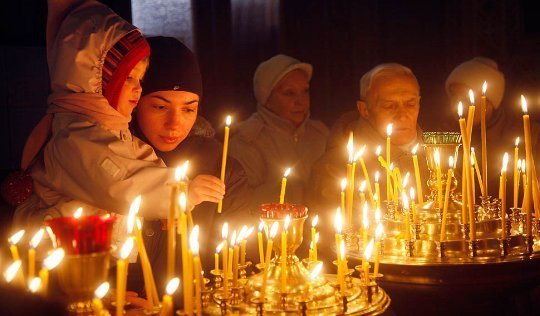

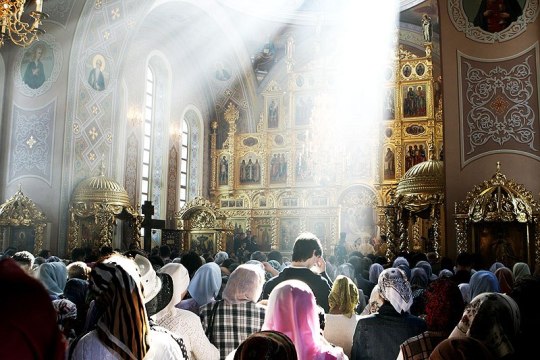
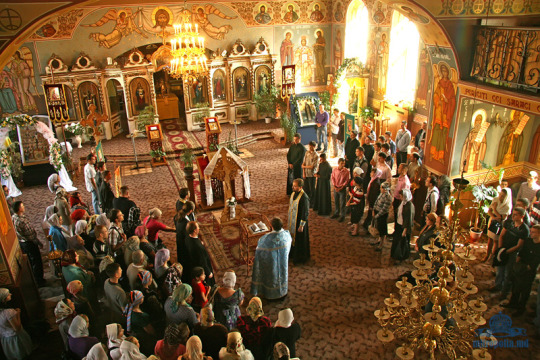
"If one were to put all of the world's most precious treasures on one side of a scale and the Divine Liturgy on the other, the scales would tip completely in favor of the Liturgy. There is nothing upon the face of the earth that is holier, higher, grander, more solemn and more life-giving than the Divine Liturgy."
- Saint John of Kronstadt (1829-1908)
49 notes
·
View notes
Text
2024 APRIL 07 Divine Mercy Sunday
"Do not be unbelieving, but believe. Blessed are those who have not seen and have believed."
~ John 20:27c,29b
#Sunday#Divine Mercy#bible#verse#scripture#gospel#apostle#saint#John#do not be unbelieving#believe and be blessed#God#Lord#Jesus#Jesus Christ#Christ
6 notes
·
View notes
Text
SAINT OF THE DAY (October 5)
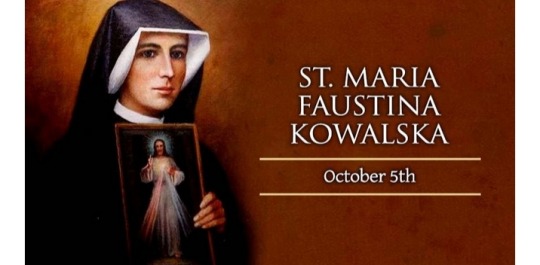
On October 5, the church celebrates the Memorial of St. Mary Faustina Kowalska, virgin.
St. Faustina was born Helena Kowalska on 25 August 1905 to a poor but devout Polish family in 1905.
At the age of 20, with very little education, and having been rejected from several other convents because of her poverty and lack of education, Helen entered the Congregation of the Sisters of Our Lady of Mercy.
There, she took the name Sr. Faustina and spent time in convents in both Poland and Lithuania.
Throughout her life, Jesus appeared to Sr. Faustina.
He asked her to become an apostle and secretary of his mercy by writing down his messages of Divine Mercy for the world in her diary.
Jesus also asked Sr. Faustina to have an image painted of his Divine Mercy, with red and white rays issuing from his heart, and to spread devotion to the Divine Mercy novena.
Even before her death on 5 October 1938, devotion to Divine Mercy began to spread throughout Poland.
This little nun and Jesus’ message of Divine Mercy impacted Karol Wojtyla greatly, which became obvious to the world when he was elected pope.
“It is truly marvelous how her devotion to the merciful Jesus is spreading in our contemporary world and gaining so many human hearts!
This is doubtlessly a sign of the times — a sign of our twentieth century.
The balance of this century, which is now ending, in addition to the advances which have often surpassed those of preceding eras, presents a deep restlessness and fear of the future.
Where, if not in the Divine Mercy, can the world find refuge and the light of hope? Believers understand that perfectly,” Pope St. John Paul II wrote.
On 30 April 2000, Pope John Paul II canonized St. Faustina in what he was widely reported as saying was “the happiest day of my life.”
“Today, my joy is truly great in presenting the life and witness of Sr. Faustina Kowalska to the whole Church as a gift of God for our time.
By divine Providence, the life of this humble daughter of Poland was completely linked with the history of the 20th century, the century we have just left behind.
In fact, it was between the First and Second World Wars that Christ entrusted his message of mercy to her.
Those who remember, who were witnesses and participants in the events of those years and the horrible sufferings they caused for millions of people, know well how necessary was the message of mercy,” the Pope said in his homily that day.
It was also on this day, the Sunday after Easter, that Pope John Paul II instituted the Feast of Divine Mercy, which Jesus had asked for in his messages to Sr. Faustina.
#Saint of the Day#St. Mary Faustina Kowalska#Helena Kowalska#Divine Mercy#Pope St. John Paul II#Feast of Divine Mercy
9 notes
·
View notes
Text
In Scripture, we shall always find the Lord of all using gentleness most worthy of love; for He does not repay with equal wrath those who blaspheme Him, although He knows that they deserve such bitter punishment. Rather, imitating the most gentle of physicians, He heeds not the insults of his patients who are mad, but patiently applies to them the fitting remedies, curing what gives them pain. Although railed against at times, the good physician truthfully explains what is for the improvement of their health, persuades them to be diligent in what is for their good, and makes known the cause of their sickness. Yes, in this very manner the Lord Jesus Christ both bears with those who blaspheme Him and does good to those who revile Him. He binds up the wounds of them who insult Him, and most clearly reveals to them the cause of their sickness– their unbelief in Him. Christ is fighting against that disease, but never against the patient, never against the sinner, whom He fervently wishes to restore to health of body and mind.
Saint Cyril of Alexandria; Commentary on John 8:15 (paraphrased)
#Saint cyril of alexandria#Jesus Christ#Divine mercy#Christ the Divine physician#Unbelief#Sin is a sickness#Sin#Spiritual healing#the love of god#remember this#biblical commentary#John 8:15#Patience
10 notes
·
View notes
Photo
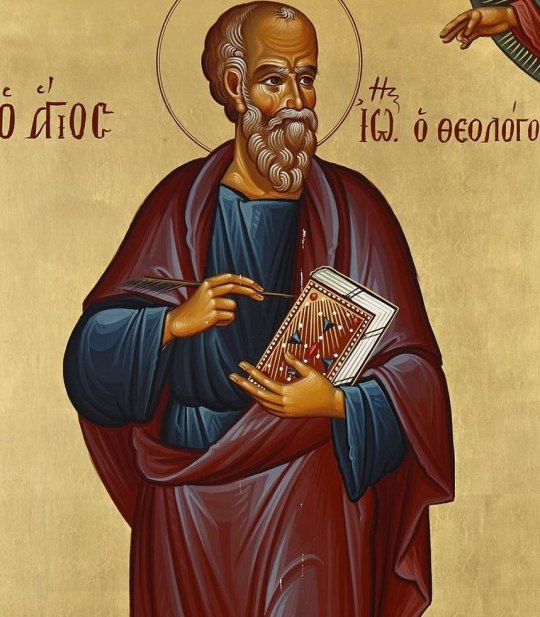
Today we celebrate the Translation of the Holy and Divine Theologian, John the Evangelist. Saint John was the son of Zebedee and Salome (one of the daughters of Saint Joseph the Betrothed), and the brother of James the Great. John and his brother were called at the same time to be followers of Christ and became two of the three (the other, Apostle Peter) closest disciples of Christ. They witnessed the healing of many people, the Light of the Transfiguration at Tabor, as well as many other miracles. Saint John, being the youngest of all the disciples, was also the most beloved disciple of Christ, following Him from the beginning of his ministry all the way to his Crucifixion and Burial. After the Resurrection of the Lord, the Evangelist took the Theotokos to his home as his own mother. After her Dormition, he went to Ephesus to preach the Word of God. Having been denounced by pagans, he was given a poisoned drink, which failed to kill him. He was then exiled to the island of Patmos where he converted many to Christ, but most famously, where he wrote the Book of Revelation, the last book of the Holy Bible. Having returned to Ephesus, he wrote the gospel under his name and also another 3 letters, all a part of the New Testament. Saint John lived to well over 100 and outlived every single eyewitness of Christ. By this time, his message was simple: love one another. He was buried and when some of his disciples came later to farewell him, they found his grave empty, thus his body having been translated to Heaven. May the Evangelist intercede for us all + #saint #john #saintjohn #stjohn #johnthedivine #johntheevangelist #evangelist #divine #jesus #christ #jesuschrist #christian #preach #bible #gospel #lastsupper #letter #translation #disciple #patmos #exile #newtestament #orthodox #saintoftheday (at Ephesus, Turkey) https://www.instagram.com/p/Ci8bKL0rTVI/?igshid=NGJjMDIxMWI=
#saint#john#saintjohn#stjohn#johnthedivine#johntheevangelist#evangelist#divine#jesus#christ#jesuschrist#christian#preach#bible#gospel#lastsupper#letter#translation#disciple#patmos#exile#newtestament#orthodox#saintoftheday
14 notes
·
View notes
Quote
Sometimes this most holy man was out of his mind for God in a wonderful manner.
John Michael Talbot on St. Francis of Assisi, “Lessons of Saint Francis”
2 notes
·
View notes
Text

"Then he spoke to Thomas: Put your finger here; look, here are my hands. Give me your hand; put it into my side. Do not be unbelieving any more but believe.'
Thomas replied, 'My Lord and my God!'"
John 20: 27-28
This Gospel is read on today's Sunday, eight days after Easter Sunday. It's also the Sunday dedicated to the Attribute of Jesus' Divine Mercy, that was spread from His heart as blood and water when it was trespassed by the spear. The wound that He kept even after the Resurrection, was offered as a proof to Thomas.
Made with pencil colors and pens at April 07 of 2024.
#Easter of Resurrection#Sunday of The Divine Mercy#Jesus Christ#Risen Jesus#Saint Thomas#Saint Apostle Thomas#Gospel of John
1 note
·
View note
Text

#Anglican Cathedrals#Anglican Church#Episcopal Church#NYC#Cathedral of Saint John The Divine#Christianity
1 note
·
View note
Text
i think it would be funny if alecto killed john in the first chapter of atn like it’s nothing and the rest of the book is just a bunch of messy bitches sorting out their problems. alecto knelt before anastasia and made a vow to her? what the fuck is that about. is that one of the reasons john needed to lock her up, because she vowed to be anastasia’s cavalier after samael died and he couldn’t deal? and pyrrha. what if pyrrha gets her body back. i hope alecto remembers pyrrha. what the hell is going on with paul. is he a lyctor. pash and gideon get into a physical altercation. the angel and also noodle, who is lamenting with his lamentable awoos. ill-shampooed slut and her lyctor wife-sister who’s even more ill-shampooed. judith deuteros and everything going on with her, and despite everything, i’d say she had the most normal and non life threatening reaction to losing her cav—but there’s still time for that to change. what if ianthe decides to become everyone’s problem. what the fuck did john mean when he told harrow he still had plans for g—‘s arm. and harrow—well i cant even begin to speculate other than questioning if she’s still got a lyctor-body but get that girl some fucking electrolytes and a pediasure before anything else drastic happens so she can at least be awake and coherent for it lmao
#what if we harnessed divine power and walked the eightfold word the right way this time#and we were both girls#atn speculation#tlt spoilers#actually what if we restored the earth back to her rightful body and renewed the wretched state of the river#what if we sacrificed ourselves for the greater good of the universe. and we were girls#honestly im kind of expecting them to Double Suicide For The Sake Of The Universe at the end of this#theyre the narrative parallel to john and alecto and they always have been#um also me realizing now that the last one standing from the resurrection is pyrrha. whats the symbolism#honestly wouldnt surprise me if any of the original saints previously thought dead were actually not dead#something fruity happened between anastasia and alecto methinks#also not to expose too much abt myself but the name anastasia is one of mine#so. knowing that it means RESURRECTION. has me like ummmmmmmmmmmmmmm
1 note
·
View note
Text

St. John Chrysostom: On Leaving the Divine Liturgy
Let us leave the Divine Liturgy like lions breathing fire, having become fearsome even to the devil, because we have received the holy Body and Blood of the Lord. By this we have been given great power! This Blood chases demons away and brings the angels near us. This Blood is the salvation of our souls; with this Blood the soul is washed clean and made beautiful. This Blood makes our minds brighter than fire!
So, encourage our brothers and sisters who are absent to come to Church! Exhort those who are deceived by demons and stay away to return. Teach whoever doesn't attend Church that you sang hymns with the seraphim, that you belong to Heaven even now and that you met with Christ and spoke with Him. Counsel them not only with words, but also with how you live. However, even if you don't say anything, but merely come out of the Divine Liturgy showing those who were absent from worship the gain you have received from Church simply by your appearance, by your gaze and your voice, by the way you walk, and with all the spiritual power you have received -- this is enough for exhortation and counsel, because the truth is that we should come out of Church as if we were descending from Heaven itself. If we live the Divine Liturgy thus, we will not have to say anything to those who were absent. But seeing how we have benefited, they will learn what they have missed and will quickly run to Church to delight in the grace and philanthropy of our Lord Jesus Christ.
To Him, together with the Father and the Holy Spirit, belongs all glory to the ages of ages. Amen!
13 notes
·
View notes
Text



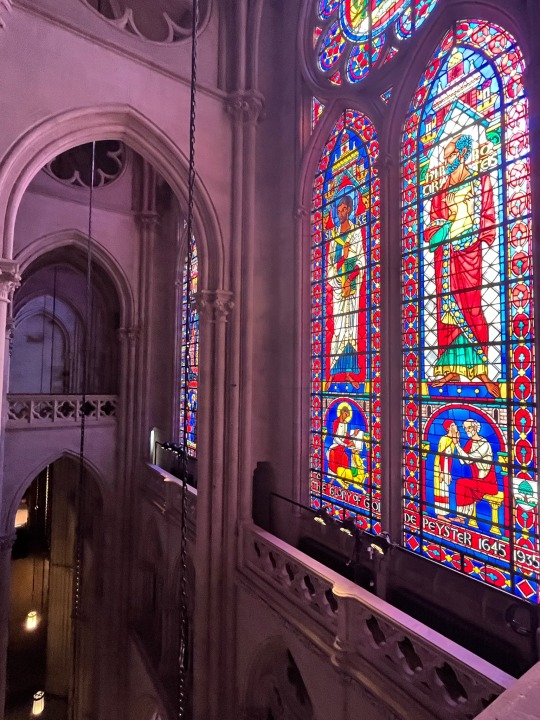

Cathedrals are the best
#I’m not religious but this is buetiful#Saint John the divine cathedral#nyc#carhedral#they let us in their attic are they insane#wait cathedrals have attics
0 notes
Text
SAINT OF THE DAY (October 5)

On October 5, the church celebrates the Memorial of St. Mary Faustina Kowalska, virgin.
St. Faustina was born Helena Kowalska on 25 August 1905 to a poor but devout Polish family in 1905.
At the age of 20, with very little education, and having been rejected from several other convents because of her poverty and lack of education, Helen entered the Congregation of the Sisters of Our Lady of Mercy.
There, she took the name Sr. Faustina and spent time in convents in both Poland and Lithuania.
Throughout her life, Jesus appeared to Sr. Faustina.
He asked her to become an apostle and secretary of his mercy, by writing down his messages of Divine Mercy for the world in her diary.
Jesus also asked Sr. Faustina to have an image painted of his Divine Mercy, with red and white rays issuing from his heart, and to spread devotion to the Divine Mercy novena.
Even before her death on 5 October 1938, devotion to Divine Mercy began to spread throughout Poland.
This little nun and Jesus’ message of Divine Mercy impacted Karol Wojtyla greatly, which became obvious to the world when he was elected Pope.
“It is truly marvelous how her devotion to the merciful Jesus is spreading in our contemporary world and gaining so many human hearts! This is doubtlessly a sign of the times — a sign of our twentieth century.
The balance of this century, which is now ending, in addition to the advances which have often surpassed those of preceding eras, presents a deep restlessness and fear of the future.
Where, if not in the Divine Mercy, can the world find refuge and the light of hope? Believers understand that perfectly,” Pope St. John Paul II wrote.
On 30 April 2000, Pope John Paul II canonized St. Faustina in what he was widely reported as saying was “the happiest day of my life.”
“Today, my joy is truly great in presenting the life and witness of Sr. Faustina Kowalska to the whole Church as a gift of God for our time.
By divine Providence, the life of this humble daughter of Poland was completely linked with the history of the 20th century, the century we have just left behind.
In fact, it was between the First and Second World Wars that Christ entrusted his message of mercy to her. Those who remember, who were witnesses and participants in the events of those years and the horrible sufferings they caused for millions of people, know well how necessary was the message of mercy,” the Pope said in his homily that day.
It was also on this day, the Sunday after Easter, that Pope John Paul II instituted the Feast of Divine Mercy, which Jesus had asked for in his messages to Sr. Faustina.
#Saint of the Day#St. Mary Faustina Kowalska#Congregation of the Sisters of Our Lady of Mercy#Divine Mercy#Karol Wojtyla#Pope John Paul II#Feast of Divine Mercy
22 notes
·
View notes
Text
[Note] Christ’s method with the sinner: To save her soul was evidently our Lord’s one thought. And He proceeded to do it in His own strange, loving way, as only He can do it. What that sin of hers was to Him, the Infinitely Pure, accustomed to the chastenesses of heaven, only the purest among us, can, in the smallest measure, see! [And yet,] mark how [that] sin affected Him. It did not alienate Him for a moment. It did not separate Him. She was never despised. She was not degraded. She was not even reproached. [Rather,] He would bring her to penitence, that He may bring her to peace. And how will He do it? By love; all love. The past is not mentioned. He raises her. He expels sin by virtue; an old feeling by a new affection. He makes Himself attractive and lovely to a heart lonely, as only sin can make us lonely. ‘Woman, where are those thine accusers? hath no man condemned thee?’ Observe in her answer a confidingness; a ray of good; an awe. She said, ‘No man. Lord.’ And then, so instant, so free, so generous, so good, so like Himself— ‘Neither do I condemn thee; go, and sin no more.’ See what Jesus would be, at that moment, to that woman! How she would love Him! How she would be always trying to please Him! How she would draw close to Him! [See, too, how] where sin is the greatest, [Christ is ever more the] gentlest! And [He will] treat everybody hopefully.
Rev. James Vaughan; Commentary on John 8:1-11
#jesus christ#the nature of god#god is love#biblical commentary#this is deeply moving#The adulterous woman#John 8#divine mercy#forgiveness#this means so much to me#do not despair#every saint has a past and every sinner has a future
4 notes
·
View notes
Text
2023 NOVEMBER 30 Feast of Saint Andrew Thursday
"Let us eagerly run our course as men called by our God and King, lest, since our time is short, we be found in the day of our death without fruit and perish of hunger. Let us please the Lord as soldiers please their king; because we are required to give an exact account of our service after the campaign. Let us charge into the good fight with joy and love without being afraid of our enemies. Rejoice in the Lord always, all servants of His, detecting in this the first sign of the Master’s love for us, and a sign that He Himself has called us."
~ Saint John Climacus, The Ladder of Divine Ascent, Step 1, n° 15, 20, 22-23
0 notes